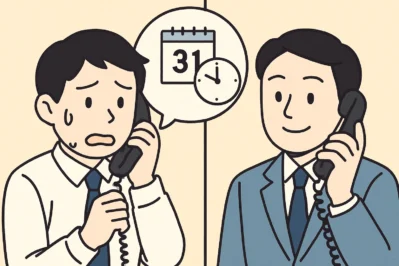Call Your Korean Colleague! How to Ask About Meeting Times
Hello! This is [Daily Korean], here to upgrade your Korean skills!
Ever felt a little nervous about making a phone call in Korean? You’re not alone! Today, we’re going to conquer that fear by learning how to ask about a meeting time over the phone. This is super useful whether you’re a student coordinating a project or working in a Korean company.
Nowadays in Korea, with many companies using a hybrid work model (working from both home and the office), making quick calls to confirm schedules is more common than ever. Let’s learn the essential phrases so you can sound professional and confident!
Core Expressions You Need to Know
Here are the key phrases that will make your phone call smooth and successful.
1. 여보세요? (Yeoboseyo?)
- Pronunciation [Romanization]: Yeoboseyo?
- English Meaning: Hello? (on the phone)
- Detailed Explanation: This is the standard way to answer the phone in Korean. It’s used for both formal and informal situations, but only on the phone. You would never say “여보세요?” to greet someone in person.
- 💡 Pronunciation Tip:
The pronunciation is quite straightforward! Just say each syllable clearly: 여 (yeo) – 보 (bo) – 세 (se) – 요 (yo)? Make sure to raise the intonation at the end, just like you would for a question in English.
2. ~씨, ~ 때문에 전화드렸습니다. (~ssi, ~ ttaemune jeonhwa deuryeotseumnida.)
- Pronunciation [Romanization]: ~ssi, ~ ttaemune jeonhwa deuryeotseumnida.
- English Meaning: Mr./Ms. ~, I’m calling because of ~.
- Detailed Explanation: This is a very polite and professional way to state the reason for your call. You attach the other person’s name to
~씨 (ssi)and the topic of your call to~ 때문에 (ttaemune), which means “because of.”전화드렸습니다 (jeonhwa deuryeotseumnida)is a humble way of saying “I gave you a call.” - 💡 Pronunciation Tip:
The ending습니다is not pronouncedseub-ni-da. Theㅂ (b)sound beforeㄴ (n)changes to anㅁ (m)sound. So, you should pronounce it as [seumnida]. This makes the flow much smoother. Try it:전화드렸습니다 [jeonhwa deuryeo-sseum-ni-da].
3. 회의가 몇 시에 시작해요? (Hoeuiga myeot sie sijakaeyo?)
- Pronunciation [Romanization]: Hoeuiga myeot sie sijakaeyo?
- English Meaning: What time does the meeting start?
- Detailed Explanation: This is the key question!
회의 (hoeui)means “meeting,”몇 시 (myeot si)means “what time,” and시작해요 (sijakaeyo)means “to start.” It’s a polite, standard phrase you can use with colleagues. - 💡 Pronunciation Tip:
When the final consonantㅊ (t)in몇 (myeot)is followed by the vowelㅣ (i)in시에 (sie), the sound often shifts. However, in standard speech for a clear question, it’s more common for theㅅ(s)in시to become tense. It sounds more like [myeot ssie] than [myeot sie]. This tensing of the consonant makes the question clearer.
4. 네, 알겠습니다. 그때 뵙겠습니다. (Ne, algesseumnida. Geuttae boepgesseumnida.)
- Pronunciation [Romanization]: Ne, algesseumnida. Geuttae boepgesseumnida.
- English Meaning: Yes, I understand. I’ll see you then.
- Detailed Explanation: This is the perfect way to end the conversation politely.
알겠습니다 (algesseumnida)means “I understand,” and그때 뵙겠습니다 (geuttae boepgesseumnida)is a very respectful way to say “I’ll see you then.” It’s much more formal than그때 봐요 (geuttae bwayo). - 💡 Pronunciation Tip:
Let’s look at뵙겠습니다. The final consonantㅂ (b)in뵙and theㄱ (g)in겠make the sound tense. It’s pronounced like [boep-kket-sseumnida]. Remember the습니다rule from before? It also applies here! It sounds complex, but with practice, you’ll sound very professional.
Example Dialogue
Let’s see how these phrases work in a real conversation. Imagine Minjun is working from home and calls his colleague, Emily, who is at the office.
(Ring, ring…)
- A (Emily): 여보세요?
- [Yeoboseyo?]
- Hello?
- B (Minjun): 안녕하세요, 에밀리 씨. 민준입니다. 내일 회의 시간 때문에 전화드렸습니다.
- [Annyeonghaseyo, Emilli ssi. Minjunimnida. Naeil hoeui sigan ttaemune jeonhwa deuryeotseumnida.]
- Hello, Ms. Emily. This is Minjun. I’m calling because of the meeting time tomorrow.
- A (Emily): 아, 네, 민준 씨. 회의는 오후 2시에요.
- [A, ne, Minjun ssi. Hoeuineun ohu dusieyo.]
- Ah, yes, Minjun. The meeting is at 2 PM.
- B (Minjun): 오후 2시요. 네, 알겠습니다. 그럼 그때 뵙겠습니다.
- [Ohu dusi-yo. Ne, algesseumnida. Geureom geuttae boepgesseumnida.]
- 2 PM. Yes, I understand. I’ll see you then.
Culture Tip & Trend Deep Dive
In Korean work culture, being polite and clear is extremely important, especially on the phone where you can’t see facial expressions. Using formal endings like ~습니다 (~seumnida) shows respect to your colleagues.
The rise of 재택근무 (jaetaek-geunmu – working from home) in Korea means that phone calls and online messages are now a central part of office life. Before, you might have just asked a colleague at their desk. Now, a quick, polite phone call is often the most efficient way to confirm details. Mastering these simple phone phrases will show your Korean colleagues that you understand and respect the changing work culture!
Let’s Practice!
Ready to check your understanding?
1. Fill in the blank:
You want to call your colleague Sujin to ask about today’s meeting. How would you state your purpose?
수진 씨, 오늘 ___________ 때문에 전화드렸습니다.
(Sujin ssi, oneul ___________ ttaemune jeonhwa deuryeotseumnida.)
2. What would you say?
Your colleague just told you the meeting is at 10 AM. How do you politely say, “Yes, I understand. I’ll see you then”?
____________________________________.
Great job today! You’re now ready to make a confident call in Korean.
Why not try using one of today’s phrases? Leave a comment below telling us, “회의가 몇 시에 시작해요?” We’ll reply






